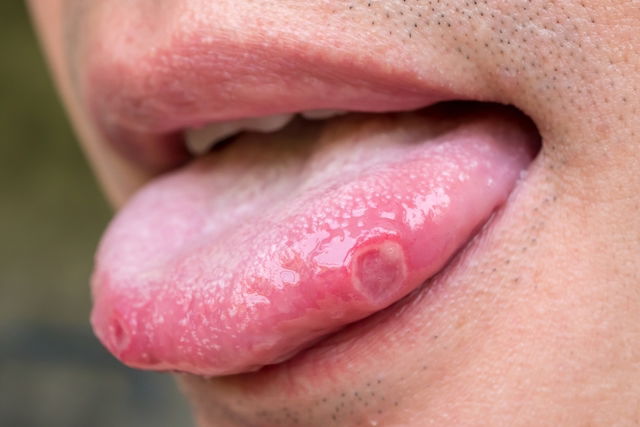A canker sore is a small, round wound that can emerge anywhere around the mouth, like on the side of the tongue, lips, cheeks, hard palate or even the throat. They cause moderate pain and can make eating or speaking difficult. These wounds are usually small, but can grow to a diameter of around 1 cm. They are often round, but can also present with an oval-like shape.
Canker sores often form on their own, but in some cases, they can appear in clusters. Although any person will have at least one or two canker sores along their life time, there are some people who have canker sores more frequently. People who notice a new canker sore every 2 weeks for about a year should seek medical attention.
Also recommended: Throat Ulcers: 7 Causes, Treatment & When to Worry tuasaude.com/en/throat-canker-soresTo cure a canker sore on the tongue, you should brush your teeth and use a non-alcohol mouth wash at least 3 times per day. You can also apply an ice cube directly on painful canker sores.

Common symptoms
The main symptoms of a canker sore on the tongue include:
- Small, white, circular or oval lesion surrounded by a red "ring"
- Intense pain in the affected area
- Increased sensitivity
- Difficulty speaking and eating
- Swelling and redness
- Itching or burning sensation
Additionally, some people may feel a stinging or burning sensation in the affected area before the cold sore itself appears.
How long it lasts
Canker sores generally disappear after 7 to 10 days, and usually heal completely with no scarring. However, if the wound is more than 1 centimeter in diameter, it may take long to heal.
When canker cores appear frequently, they should be assessed by a doctor, as this could be a sign of illness. The doctor should order testing to confirm a diagnosis and start treatment as necessary.
Possible causes
Canker sores can emerge in people of all ages, including babies. Although the exact cause of them is not well known, there are some factors that may play a role in canker sores appearing. These include:
- Biting the tongue
- Eating citric foods like kiwi, pineapple or lemon
- Changes to mouth pH, which can happen with indigestion
- Vitamin deficiency
- Food allergies
- The use of braces
- Stress
- Auto-immune disease
A weak immune system can promote the appearance of canker sores, which is why people with AIDS or cancer tend to have canker sores more frequently.
How to get rid of them
Canker sore treatment is aimed at relieving associated symptoms. Many home remedies may be beneficial, however some cases may require actual medication like topical analgesics, anti-inflammatories and antibiotics. Check-out some ways to get rid of canker sores on the tongue below:
1. Home remedies
A good way to get rid of a canker sore quickly is to brush your teeth and use a non-alcohol mouth wash at least 3 times per day. The antiseptic properties in the mouth was are able to eliminate a larger amount of microorganisms, which keeps mouth tissue clean and allows the canker sore to heal faster.
Also recommended: 11 Natural Ways to Cure Mouth Ulcers Fast tuasaude.com/en/mouth-ulcersApplying an ice cube directly over the canker sore is another great way to numb the area so that you do not feel pain when eating. Other, more natural strategies to get rid of a canker sore include:
- Apply tea tree oil directly over the canker sore
- Suck on a clove and keep it in your mouth
- Take 1 teaspoon of honey mixed with propolis extract
See other reasons why canker sores may appear and how you can treat them.
2. Pharmacy medication
There are some topical medications available for purchase at the pharmacy that you can use to heal your canker sore quicker. Ointments with numbing agents, like lidocaine, can help to relieve pain. Others may contain anti-inflammatories, like fluocinonide, which help to reduce swelling and discomfort. Ointments that contain hydrogen peroxide may also speed up healing.
Although it is rare, people who have frequent canker sores that interfere with eating and overall quality of life can be prescribe lidomide, dapsone and colchicine. The doctor should follow-up with you on a monthly basis if you are on medication to verify the dosing and side effects associated with these medications.
